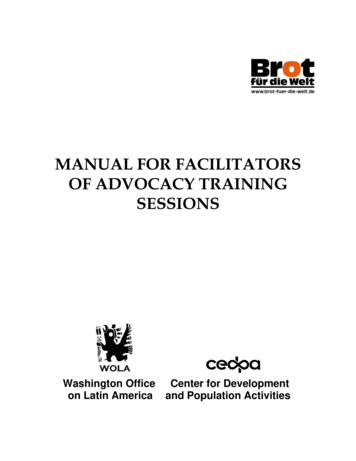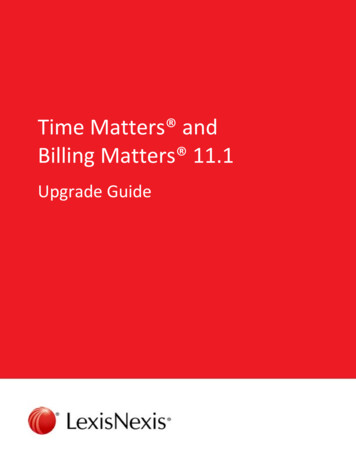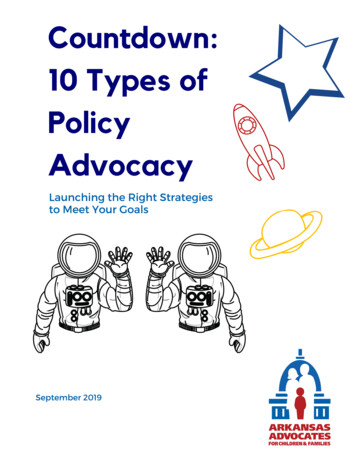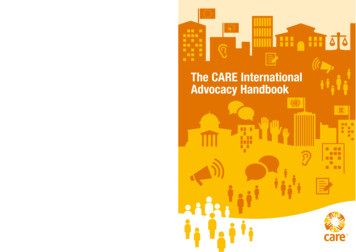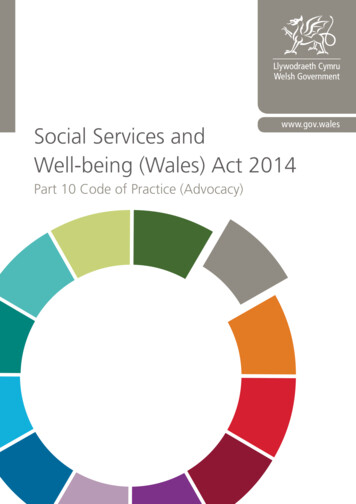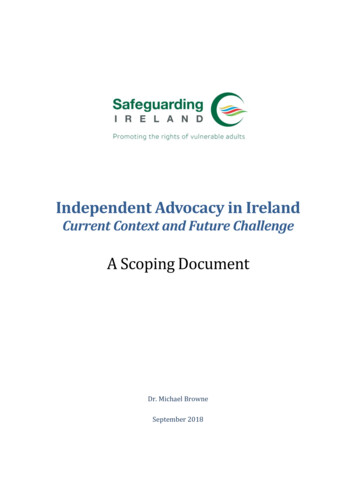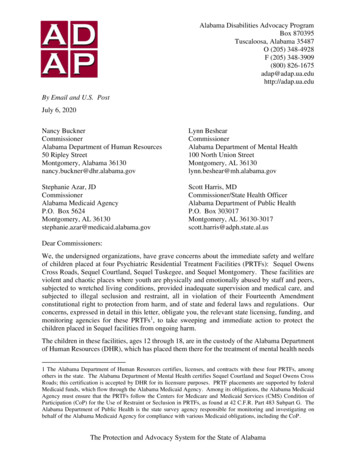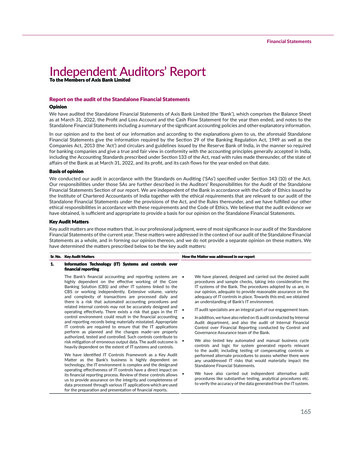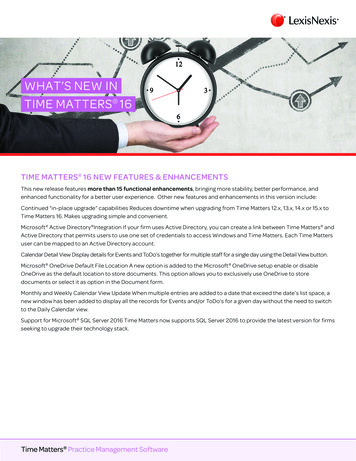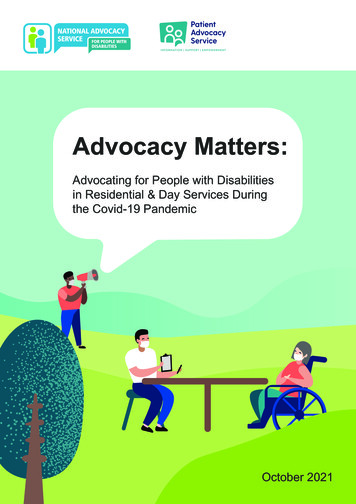
Transcription
Advocacy Matters:Advocating for People with Disabilitiesin Residential & Day Services Duringthe Covid-19 PandemicOctober 2021
Advocacy MattersContentsAbout this Report 4Key Recommendations in this Report5Key Conclusions in this Report6Impact of Covid on Our Services 7Covid in Residential & Day Services: Responding to theCrisis 8Isolation and Mental Health 13Communication on Public Health Guidance14Visiting Restrictions in Residential Services15Withdrawal of Day Service Provision17Daily Activities: Some Positive Outcomes20Simon’s Story: Coping with Day Service Restrictions21Decision Making Mary’s Story: Support with Decision Making2225Transport 26Transitions from Congregated Settings 27Respite 29Safeguarding John’s Story: Support to Access My MoneyConclusions and Recommendations 3032333
4Advocacy MattersAbout this ReportThis report has been developed by the National Advocacy Service for Peoplewith Disabilities (NAS) and the Patient Advocacy Service.It is the first of four reports which outline our observations and experiences inproviding independent advocacy to people who required our support during theCovid-19 pandemic, particularly during the period from March 2020 - March2021. Each report will look at a different theme.This report, theme one, explains the issues faced by people with disabilities inresidential services and day services during this traumatic period. It focuses onthe work carried out by NAS, outlining the support we provided and the positiveoutcomes this advocacy support helped to achieve. It shows the key role thatadvocacy services play in supporting people who may be vulnerable in Irishsociety, particularly during periods of crisis.Established in 2011, the National Advocacy Service for People with Disabilities(NAS) is an independent, free and confidential service, funded and supportedby the Citizens Information Board. NAS provides representative advocacy topeople with disabilities across Ireland, to ensure that their will and preferencesare heard in decisions that affect their lives.NAS also hosts the Patient Advocacy Service, established in October 2019,which is commissioned and funded by the Department of Health. This free,independent and confidential Service provides information and empowermentadvocacy to people who want to make a formal complaint through the HSE‘Your Service, Your Say’ complaints policy in relation to their care in a HSEfunded public acute hospital or a HSE-operated nursing home.The vision of NAS is one where people with disabilities can exercise their rights,with dignity, autonomy, equality and independence at the core. NAS recognisesthe capacity of people with disabilities to make their own decisions equally withothers, in accordance with the United Nations Convention on the Rights ofPeople with Disabilities1 (UNCRPD). NAS works to advocate for the person’swill and preference and to have their voice heard.Both NAS and the Patient Advocacy Service recognise the rights of all peopleto support, guidance and information when issues arise in relation to their careand treatment which may lead to their wish to complain about their treatment orcare or seek answers in the aftermath of a patient safety incident.Please note, all statistics presented in this report are specifically lookingat the period March 2020 – March 2021. They report on emerging andongoing issues, resulting from the Covid-19 pandemic, which impacted onthe lives of people with disabilities supported by NAS.1United Nations Convention on the Rights of People with Disabilities es.html
Advocacy MattersKey Recommendations in thisReport A human rights-based approach should be the focus of any future plans orstrategies that are developed for people with disabilities. This will ensure theyare at the centre of the decision-making process, leading how they live theirlives during periods of crisis and providing input into the development of keypolicies and legislation. NAS should be adequately funded and resourced to ensure that it cancontinue to support people with disabilities to have their will and preference indecision making upheld. It is crucial that the rights and freedoms of people living in residential servicesare upheld and restrictions on family visits are lifted. Residential services needto be innovative and should do their utmost to support people to maintaincontact and links with family and loved ones, utilising technology. NAS provided advocacy support for people who communicate differently,helping to ensure their voice, will and preference was represented inthe decision-making process. It is also imperative that Service providersadequately support people around decision making, especially those whocommunicate differently. It is also vital that the restrictions preventing people from accessing dayservices are removed, in line with the Framework for the Resumption of AdultDisability Day Services2. As outlined in the ‘Value for Money and Policy Review of Disability Servicesin Ireland’3 and in ‘New Directions: Interim Standards for New Directions,Services and Supports for Adults with Disabilities’4, there should be a moveaway from group-based activities for people with disabilities to a more personcentered service delivery. Working in a person-centred way with individualisedsupports is more reflective of HIQA’s Guidance on a Human Rights-basedApproach in Health and Social Care Services5.2345Framework for the Resumption of Adult Disability Day Services Supporting People with Disabilities in the contextof COVID-19: The Next Year umption-of-adult-disability-day-services.pdfValue for Money and Policy Review of Disability Services in Ireland ability-services-in-ireland.pdfNew Directions Interim Standards for New Directions, Services and Supports for Adults with r%20new%20directions%20report.pdfHIQA’s Guidance on a Human Rights-based Approach in Health and Social Care Services man-Rights-Based-Approach-Guide.PDF5
6Advocacy Matters NAS has continued to advocate for the full restoration of respite services forpeople with disabilities. It is also important for service providers to be innovative intheir service provision for people in the absence of full respite services. NAS made referrals to the HSE’s safeguarding teams and supported peopleto be involved with their safeguarding plan. NAS has escalated concernswithin services and the safeguarding social work teams in CHO areas whennecessary. It is critical that the financial rights and the safety of people withdisabilities in residential services and in the community are upheld. Essential services like, community-based safeguarding social work teams,should be seen as a vital service for those with disabilities and not redirectedinto other duties.Key Conclusions in this Report Advocates have helped people to have their voice heard and to progressissues and decision making in line with their own wishes. Throughout thecourse of the Covid-19 pandemic, they have made a significant difference tothe lives of people with disabilities in residential and day services. Next of kin has no legal basis for anyone to make a decision on behalf ofa person with a disability unless they have specific legal authority to do so.However, often decisions are made on this basis about people with disabilities. NAS liaised with services on people’s behalf to communicate their questionsand concerns and ensured they responded effectively to support the person,representing their will and preference to the residential service providers. NAS supported people in congregated settings to express their will andpreference to service providers in respect of their living arrangements andduring their transitions to new homes. NAS has continued to highlight theimportance of progressing moves in a timely manner to ensure that peoplewith disabilities can return to normal, fulfilling lives. NAS played a key role in ensuring that individuals were keptfully informed by service providers about the latest on publichealth developments and guidance, including how they mightbe affected. NAS advocated for these to be proportionateand balanced against the human rights of the person withdisabilities.
Advocacy MattersImpact of Covid on Our ServicesBefore focusing on Covid-19’s impact on residential and day services, it isimportant to note the impact of the virus on the services provided by NAS andthe Patient Advocacy Service.The emergence of the Covid-19 virus in March 2020 meant it was impossiblefor the two services to continue their normal way of office working, includingmeeting people face-to-face. Overnight, they moved to working from home, asituation which continues over one year later.However, while some organisations struggled to respond effectively tooperational changes, NAS and the Patient Advocacy Service manage nationalphone lines and online methods of enquiry (email, website). This has ensuredthat both Services have continued to advocate for people with disabilities toensure that their voices are heard when decisions are being made on publichealth grounds, and to advocate with them and for them to have access toservices and supports at this challenging time.In addition, particularly at the beginning of the pandemic lockdown, NASAdvocates provided support beyond their remit by helping people to accessservices such as shopping, GPs and pharmacies, as well as Covid-19 pandemicunemployment payments.Meeting the people we support face-to-face also proved challenging asAdvocates could not spend time with them to observe and understand theirwill and preference fully. Responding to these difficulties, Advocates utilisedalternative methods of communication such as, phone calls, video calls,emailing and text messaging. To continue with the provision of advocacyfor some people, particularly those who communicate differently (throughbehaviour and gestures or assistive technology as opposed to verbal or writtencommunication) Advocates had to rely on the support of families and serviceproviders to aid with continued communication. Despite these communicationchallenges, NAS worked with the person to ensure their will and preferencewere carried out.The Patient Advocacy Service has also continued to provide advocacy supportand information to users of its service during the pandemic through its nationalphone line and online forums. It provided long arm support to people arounddifficulties they experienced with their home-based care, whether living in theirown home or community setting, including providing access to information.7
8Advocacy MattersCovid in Residential & DayServices: Responding to theCrisis“It’s nice to hear from someone who can put a smile on myface at a time when I really need it; it’s very lonely, so thankyou so much.”Joan, who lives in a residential service and has been supported by a NASAdvocate since May 2020.NAS has a particular remit to work with those who may be isolated from theircommunity of choice or mainstream society, those who may communicatedifferently (through behaviour and gestures or assistive technology as opposedto verbal or written communication) and those who have limited informal ornatural supports. NAS upholds the person’s rights, ensuring fair and equaltreatment and access to services.Advocates make certain that decisions are taken with dueconsideration for a person’s unique preferences and perspective,will and preference.NAS representative advocacy involves professional, trained experts in advocacydealing with specific issues and working with an individual until that issuereaches conclusion. Independent, representative advocacy is directed by thepeople who use it. Where the person communicates differently, the Advocate isstill directed by the person.In ordinary times, the people that NAS works with face rights restrictions andhave poorer access to health, education and employment. They have difficultiesin accessing justice and decision making and are more likely to experiencediscrimination.People with disabilities and those accessing health and social care supportsare a very diverse group and some within this group face even greatermarginalisation. These include those experiencing mental health issues, thosefrom different migrant or ethnic groups, and those who communicate differently.During the Covid-19 pandemic, these issues were further exacerbated for peoplewith disabilities living in residential services and attending adult day services.
Advocacy MattersResidential settings have been particularly vulnerable to outbreaks of Covid-19.There has been an increased risk of infection for people living in these settingswho, despite preventive measures, may not be able to socially distance, washtheir hands or wear their masks. The people living there also have a higher riskof transmitting the virus6. People with disabilities are also more likely to haveexisting health issues which increase their risk if they contracted Covid-19. Thishas been a cause of great anxiety for many people with disabilities living inresidential services.People with disabilities living in residential settings and attending dayservices have also been more likely to be impacted by the public health andother measures taken to reduce infection which restricted their access tosupports, services and their community. Restricted access to non-Covid-19health services has impacted people with disabilities to a greater extent.When combined with reductions in other public services, including transport,education, housing supports and limited access to technology, this led toincreased mental health concerns for people with disabilities.Of the 1,300 registered residential disability services, with approximately 8,300people living in them, “it is estimated that sadly 21 people to date living in suchfacilities have died from Covid-19 (0.2% of residents)”7. In January 2021, HSEChief Operations Officer, Anne O’Connor, stated that there were 183 outbreaksof Covid-19 in disability and mental health services8.Visiting restrictions introduced in residential services to prevent the transmissionof the virus have also meant that people living in these services have dealt withprolonged periods without face-to-face contact with friends or family. This hasled to isolation, loneliness and anxiety for many people with disabilities.678Rapid review of public health guidance for residential care facilities in the context of COVID-19 https://www.hiqa.ie/sites/default/ f-COVID-19.pdfDisability Services - Preparedness and Ongoing Response to Covid-19 file:///C:/Users/Lisa%20Walsh/Downloads/120324 03288a70-bf9e-4312-919c-b3a24b6adc82.pdf pg. 1078-covid-19/9
10Advocacy MattersLocation of People with Issues Impacted by Covid-1925%Residential Service Provider20%Living independently in the community16%Living with family15%Living Independently in the Community with Support13%Nursing Home5%Hospital Settings5%Other2%No Fixed AbodeNAS estimates that of those it supported with an issue impacted by Covid-19,from March 2020 - March 2021, 25% were from people with disabilities living inresidential services. Of the 25%, 17.05% with an issue impacted by Covid-19were in relation to those living in a residential service with 5 residents, 5.11%were those living in a residential service with 5-9 residents, and 2.61% werethose living in a residential service with 10 residents (congregated settings).
Advocacy MattersLocation of Person with an Issue Impacted by Covid-19Residential Services - 25%5%Living independently in thecommunity5% 2%Residential ServiceProvider ( 5 Residents)20%12%Residential ServiceProvider (5-9 Residents)Residential ServiceProvider (10 Residents)Living with family15%17%16%3%5%Living Independently in theCommunity with SupportNursing HomeHospital SettingsOtherNo Fixed AbodeCongregated settings are institutions or residential campuses where ten or morepeople share accommodation. According to the Health Information and QualityAuthority (HIQA) in their ‘Annual overview report on the inspection and regulationof disability services in 2019’, 1 in 3 people continue to live in these types ofsettings and “are at greater risk of having a poor quality of life compared toresidents who live in community settings”9. In relation to Covid-19, people livingin congregated settings are also at a higher risk of contracting the virus10.As part of ‘Time to Move on from Congregated Setting: A Strategy for CommunityInclusion’11 it is planned that all people currently living in a congregated settingswill move to live in their community and have individualised supports to meet theirneeds. This move to transfer people from these settings continued throughout2020, with 95 people moving according to the ‘Disability services – preparednessand ongoing response to COVID-19’12. However, for some people supported byNAS the move from these settings has been stalled and had challenges.9101112Annual overview report on the inspection and regulation of disability services in 2019 QA-Disability-Services-2019-overview-report.pdf, pg.6ECDC Rapid Risk Assessment (19 Nov 2020) ‘Increase in fatal cases of COVID-19 among long-term care facilityresidents in the EU/EEA and the UK’ -term-care-facility-residents.pdfTime to Move on from Congregated Settings A Strategy for Community Inclusion lusion.pdfDisability Services – Preparedness and Ongoing Response to Covid-19 file:///C:/Users/Lisa%20Walsh/Downloads/120324 03288a70-bf9e-4312-919c-b3a24b6adc82.pdf11
12Advocacy MattersAdult day services were closed as part of the Covid-19 restrictions introduced inMarch 2020. They remained closed for a significant period even after lockdownswere lifted across the country for businesses to open their doors. This hasimpacted heavily on adults with disabilities who attend day services andcontinues to affect some who still are waiting to go back to their service. Theseindividuals have lost access to the social interaction, structure, and routine theyrequired. It has impacted on people’s mental health and led to isolation, anxiety,and a loss of confidence and skills for many people.Issues Impacted by Covid-19Experienced by People NAS SupportedMarch 2020 - March 2021Mental Health and Wellbeingissues due to Covid-193%Residential and HealthcareSettings1%3% 2%3%OtherParenting with a Disability14%4%HealthSocial Care5%Housing5%12%5%Access to JusticeFamily and RelationshipsFinancial Issues/matters7%11%8%8%9%Communication issues (dueto lack of face to face option)Decision MakingComplaintsAccess to MDT ServicesSafeguardingIssues for CIB FundedServices
Advocacy MattersIn response to these issues, the work carried out by NAS since the onset of theCovid-19 pandemic has shown the importance of advocacy services. Advocateshave worked to alleviate the loneliness and anxiety felt by many people, theyhave helped to improve communication between staff, residents and families,and they have negotiated increased support for people with disabilities inparticularly difficult situations.Advocates have helped people to have their voice heard and to progress issuesand decision making in line with their own wishes. Throughout the course of thepandemic, they have made a significant difference to the lives of people withdisabilities in residential and day services.Isolation and Mental Health“Thank you so much to you [the NAS Advocate] for all yourhard work. It’s not everyone I can connect with, but I knewthat you cared.”Anne, who lives in a residential service and was supported by a NASAdvocate during the Covid pandemic.Statistics compiled by NAS show that mental health and well-being has beenthe biggest single emerging issue impacted by Covid for people with disabilitiesreceiving the Service’s support during the Covid-19 pandemic.13
Advocacy MattersFor the period March 2020 - March 2021, mental health and wellbeing accountedfor 14% of the emerging issues impacted by Covid and dealt with by NAS. Theseissues peaked for people availing of our service in March - May 2020 when allservices were closed almost overnight. Issues around mental health were attheir highest in April, when they were reported almost twice as much as anyother issue in this month. Mental health and well-being were the most reportedissues to NAS. Issues highlighted by people working with NAS included the poorcommunication of public health guidance to people living in residential services,visiting restrictions in residential services and withdrawal of day services.Mental Health and Wellbeing Issues Impacted M14Communication on Public Health GuidanceAt the start of the pandemic, NAS learned that poor communication about publichealth developments was a major cause of worry for people with disabilitiesliving in residential services. Many people said they were not being kept up todate on the latest Covid news or government advice and that communicationwas lacking from the staff in these settings. They were concerned about theunknown aspects of Covid and how to stay as safe as possible while followinghealthcare protocols and risk management.Media reporting was heightened, particularly in the early months of the firstlockdown, and residential services were identified as being in this high-riskcategory. Many people with disabilities were also identified as high-risk due toconcerns about their underlying medical conditions and living in a congregatedsetting if they contracted the virus. All these factors contributed towards anincreased sense of fear and worry for people with disabilities within residentialsettings.
Advocacy MattersNAS supported people to ensure they received the mostup to date and accessible information from services.Advocates were told that some people feared “breakingrules” as guidance was changing. NAS liaised withservices on people’s behalf to communicate this worry andensure they responded effectively to support the person.NAS also played a key role in ensuring thatindividuals were kept fully informed in a timelymanner by service providers about the latest publichealth developments and guidance, including howthey might be affected. This helped alleviate thestress felt by people in relation to Covid-19.Visiting Restrictions in Residential ServicesPeople living in residential services also reported to NAS that visiting restrictionsimposed during the Covid-19 pandemic had a negative effect on their mentalhealth. People faced prolonged periods of time without direct contact with theirfamily and loved ones.The restrictions also created issues for NAS Advocates. Following the first initiallockdown, when restrictions began to ease, they were able to meet with peopleface-to-face to progress advocacy case work. This was facilitated by residentialservices, many of whom created designated meeting rooms. However, duringlevel 5 restrictions, face-to-face visits were no longer permissible for Advocateswhich meant they were unable to provide the full advocacy support that manypeople required, particularly to people who communicate differently.These restrictions understandably led to feelings of isolation, anxiety and fearfor many people in residential services. The restrictions also failed to reflectHIQA’s National Standards for Residential Services for Children and Adultswith Disabilities13 and the recently published Guidanceon a Human Rights-based Approach in Health and SocialCare Services14. These reports stress that the residentialservice provider must ensure that people with disabilities aresupported to maintain and develop personal relationshipswith family and others. The rights of people with disabilitiesdo not change during a time of crisis and services need to becreative in how they support people.1314HIQA’s National Standards for Residential Services for Children and Adults with Disabilities andards-Disabilities-Children-Adults.pdfHuman Rights-based Approach in Health and Social Care Services an-Rights-Based-Approach-Guide.PDF15
16Advocacy MattersWith this in mind, NAS encouraged residential services to be innovative and todo their utmost to support people to maintain contact and links with family andloved ones during this difficult time. This included the utilisation of technologysuch as WhatsApp and Zoom.Staff within residential services supported people to use phone and videotechnology to communicate with their Advocates. This also ensured that theywere able to keep in regular contact with their families and loved ones whichhelped to reduce their isolation and fear.In addition, NAS worked with people with disabilities and service providers toensure that visits with family, where appropriate, could be accommodated safelyas guidelines eased. However, despite this easing, NAS learned of some caseswhere strict guidelines remained in place in residential services.Advocates supported people in these cases to ensure the public healthmeasures that were in place were proportionate and balanced against thehuman rights of the person with disabilities.During this difficult time, Advocates also increased the support they providedfor people with disabilities in residential services. They regularly carried outmeetings over Zoom to check people were coping as well as possible and whenrequired they ensured people had access to mental health professionals.Despite the improving situation in society in relation to Covid-19, NAS is awarethat some residential services still have visiting restrictions in place. Thiscontinues to impact negatively on the physical and mental health of the peopleliving there. NAS continues to help these individuals represent their will andpreference to the residential service providers.
Advocacy MattersWithdrawal of Day Service ProvisionThe reduction in essential day services also had a serious impact on the mentalhealth of people with disabilities, their families and carers. NAS has supportedmany people who have experienced anxiety and depression, while others havebecome withdrawn and disengaged from services.Day services provide opportunities for people with disabilities to take part inactivities they enjoy. They offer them the chance to participate and engagein their communities and employment, access Multi-Disciplinary Team (MDT)supports, and meet friends and peers. For many, they also provide an importantlink to supports outside the family home.As a result of the reduction in services, people were unable to socialise andtake part in activities which were already limited before the Covid-19 pandemicbegan.Although they were aware of the dangers caused by the pandemic,many people with disabilities were conscious that their freedomswere going to be disproportionately impacted when compared withthe general population.In May 2020, the HSE developed the Framework for the Resumption ofAdult Disability Day Services15, a plan for day service supports for the nextyear. Throughout the closure of day services, they typically maintained somecontact on a weekly basis, via telephone or video calls, with those living in thecommunity but the supports that could be provided remotely were limited. Someday services organised Zoom video group activities for people in the communityor sent activity packs to people.As a result, family members and carers, many of whom were older parents,faced increased pressure to provide full-time care at home. They have spokenabout their feelings of exhaustion and isolation during this period as theystruggled to provide full-time care whilst balancing existing family and workcommitments without access to any support or respite.15 Framework for the Resumption of Adult Disability Day Services Supporting People with Disabilities in thecontext of COVID-19: The Next Year sumption-of-adult-disability-day-services.pdf17
18Advocacy MattersIn response, the range of supports provided by NAS for people living at homehas been comprehensive, from checking in with people, to linking them in withappropriate services and supports in their own community, such as PrimaryCare Teams, Gardaí or local authorities so they can receive assistance withfood and medication.Advocates have also supported people to access appropriate personalprotective equipment (PPE) if carers were accessing their homes and theynegotiated with care providers to ensure that they removed PPE from people’shomes and did not leave it to be disposed of by family members.Location of those reporting day service issues1%7%4% 4%Living with familyResidential Service Provider11%Nursing Home44%29%Living independently in thecommunity with supportOtherLiving independently in thecommunityNo Fixed AbodeOf the people who contacted NAS with day service issues impacted by Covid,44% of them were living at home with family. In one case, NAS supported ayoung person with agoraphobia and poor mental health. The person, whoexperienced chronic anxiety and w
advocacy to people who want to make a formal complaint through the HSE 'Your Service, Your Say' complaints policy in relation to their care in a HSE-funded public acute hospital or a HSE-operated nursing home. . within services and the safeguarding social work teams in CHO areas when necessary. It is critical that the financial rights and .
